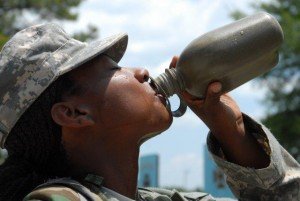
During the summer months, temperatures in Germany can reach 90 degrees Fahrenheit and warmer, and for residents of U.S. Army Garrisons these temperatures can prove uncomfortable. Though air conditioning units might seem an adequate solution, housing regulations prohibit their use.
The garrisons adhere to policies set by Installation Management Command Europe. For non-administrative areas such as residential housing, the policies allow for air conditioning only in locations where the dry bulb temperature is 80 degrees Fahrenheit or warmer during the warmest six months of the year for 650 hours or more. Ansbach, Germany for example, only attains these temperatures for a maximum of 200 hours, well short of IMCOM-E’s eligibility requirements.
No housing area at any other part of Germany meets this parameter.
Air conditioning units can also pose health and safety risks. Overloaded power outlets are a risk for house fires, and unchecked water condensation from an AC unit can lead to mold growth, according to the USAG Ansbach Safety Office.

Even without the aid of air conditioning, however, there are several ways to beat the heat:
- In homes, roll down shutters during the day and open windows during the night. Preventing the entrance of light during the heat of the day will prevent a residence from heating up too much, and the cooler temperatures of night and early morning will keep those temperatures lower.
- Drink more water. Whether you are physically active or at rest, an increase in temperature necessitates an increase in fluid consumption, according to the Centers for Disease Control and Prevention. Those performing heavy physical activity in the heat should drink two to four glasses of cool fluid each hour. These fluids should be non-alcoholic and not contain large amounts of sugar, as alcoholic and high-sugar drinks can cause the body to lose fluids.
- Replace salts and minerals. Sweating can cause you to lose the salt and other minerals your body needs to function correctly. Sports beverages can help replace those salts and minerals, according to the CDC, though they caution those on low-salt diets to consult their doctors before drinking sports beverages or taking salt tablets.
- If performing work in the heat, the U.S. Army Public Health Command has put together a work/rest chart (select “U.S. Army Public Health Command work / rest / hydration / heat chart” in the “Related Links” section on this page) for different levels of work at different temperatures. Fluid intake per hour should not exceed 1.5 quarts, and total fluid intake per day should not exceed 12 quarts.
- Wear lightweight, light-colored, loose fitting clothing. Dark-colored clothing absorbs heat, and light-colored clothing reflects it.
- Protect yourself from the sun. Sunburn can negatively affect your body’s ability to cool itself and can cause a loss of body fluids, according to the CDC. If outdoors, wearing a wide-brimmed hat and sunglasses can prevent damage from the sun. The CDC also recommends wearing a sunscreen of SPF 15 or higher and to choose a product that offers either “broad spectrum” or “UVA/UVB” protection.
- Schedule outdoor work during the cooler times of day. Limiting outdoor activities to the morning and evening hours – rather than during the heat of midday – can help prevent heat injuries.
